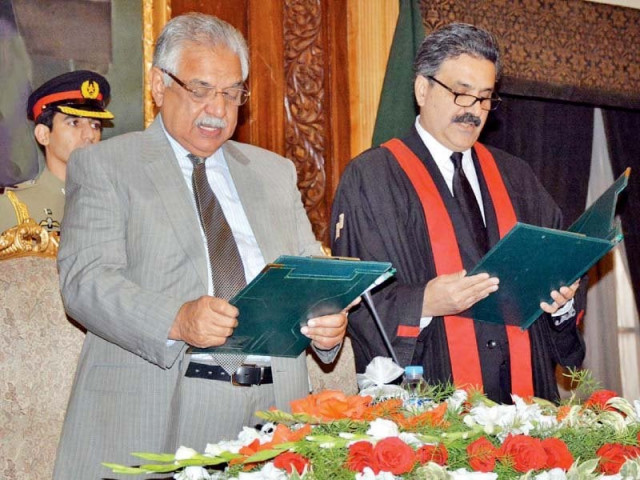CJP proposes elevation of PHC chief justice to SC
Summons a meeting of the Judicial Commission of Pakistan on June 2

The Khyber-Paktunkhwa governor administers oath to new Chief Justice of Peshawar High Court, Justice Yahya Afridi. PHOTO: ONLINE
Sources revealed to The Express Tribune that the CJP has summoned a meeting of the Judicial Commission of Pakistan (JCP) on June 2 to consider elevation of Justice Afridi as well as nomination of Justice Waqar Ahmad Seth as the new PHC chief justice.
After the elevation of Justice Afridi, the Supreme Court will regain its full strength. Presently, 16 judges are working in the top court with one seat lying vacant.
JCP to consider appointment of two FSC judges today
If Justice Afridi is elevated in coming days then he will work as the SC judge till January 22, 2030 and he also will be in line to become chief justice of Pakistan after the retirement of Justice Muneeb Akhtar.
According to the SC’s seniority list, Justice Asif Saeed Khosa will be the next chief justice of Pakistan. After his retirement, Justice Gulzar Ahmad, Justice Umar Ata Bandial, Justice Qazi Faez Isa, Justice Mansoor Ali Shah and Justice Muneeb Akhtar will become chief justices of the country.
At present, only Khyber-Pakhtunkhwa (K-P) judge – Justice Mazhar Alam Khan Miankhel – is working in the apex court. Justice Afridi will be the second one from the province.
Incidentally, no judge has been elevated from Balochistan since 2014, when Justice Isa was appointed as an SC judge. He is currently the only judge from Balochistan. Meanwhile, eight judges including the CJP are from Punjab, and six are from Sindh.
Since establishment of the Islamabad High Court (IHC) in 2010, only one judge – Justice Iqbal Hameedur Rehman – has been elevated to the SC. One section of lawyers believes that the criteria of judges’ elevation should include competence and reputation, and seniority should not be the primary factor.
The Pakistan Bar Council (PBC) member Raheel Kamran Sheikh said as a matter of principle, only the best of the high court judges should be appointed as an SC judge and the nomination for that should be based on competence, integrity, performance and juristic ability and not necessarily on seniority.
“Firstly, such appointment is not a promotion; secondly, the SC is the final court of appeal so every decision should state reasons with utmost ability; the SC exercises most significant and unusual power while exercising its original jurisdiction under Article 184 of the Constitution; All decisions of the SC serve as precedents to be followed all over the country.
“This raises legitimate concern that while dispensing with seniority, the power to elevate judges in the SC might be subjected to arbitrariness and favouritism; therefore, we, in the last PBC meeting … demanded structuring of this discretionary power by the JCP while amending its rules,” he said.
Justice Yahya recuses himself from hearing Musharraf treason case
The PBC member said before ruling out any possibility of fair structuring of discretion by the JCP in this regard, it would only be appropriate to give it a chance to propose workable amendments, for the alternative of adhering to the principle of seniority will only ensure status quo.
He said Justice Arifi's elevation will be another good addition in the apex court.
The procedure for judges’ appointments is already under severe criticism from bar representatives. Several resolutions have been passed to amend the JCP’s rules 2010 to end the discretionary powers of the CJP in judges’ appointments.
The JCP comprises five senior-most judges, the attorney general for Pakistan, the law minister, and a bar representative. After deliberating, the JCP sends its recommendation to the Parliamentary Committee on Judges Appointments for further consideration.



















COMMENTS
Comments are moderated and generally will be posted if they are on-topic and not abusive.
For more information, please see our Comments FAQ